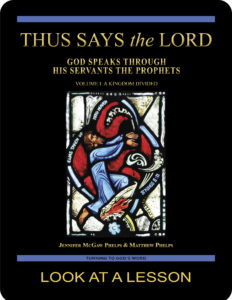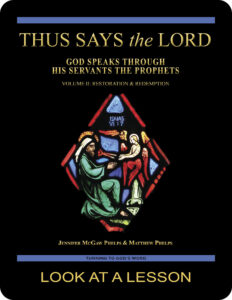prophet
 In book of Deuteronomy 18:15–19 (NABRE), Moses tells the people that he will raise up a prophet “like him” to speak to them because the people have requested that they do not want to hear the voice of the LORD directly. We often think of a prophet primarily as one who foretells the future, but in this context, a prophet has a much different role.
In book of Deuteronomy 18:15–19 (NABRE), Moses tells the people that he will raise up a prophet “like him” to speak to them because the people have requested that they do not want to hear the voice of the LORD directly. We often think of a prophet primarily as one who foretells the future, but in this context, a prophet has a much different role.
The Hebrew word for prophet, נָבִיא (navi), is related to speaking. The Greek word προφήτης (prophetes) comes from the verb πρόφημι (prophemi), a combination of a verb meaning “to speak” and the prefix “pro-“. This prefix can mean either “before” in the sense of time, or “in front of” or “forth” in a spatial context. In line with this week’s reading from the book of Deuteronomy, the ancients viewed prophecy spatially as someone speaking forth to a group of people to disclose the words of God.
Why do you think it is that the people wanted someone to speak to them on God’s behalf? How do we as Christians hear the voice of God?
related topics: apostle; prophecy; word of God
you also may like our two-part study of the prophets

 Thus Says the LORD: God Speaks Through His Servants the Prophets—Volume I: A Kingdom Divided examines the prophets in their historical context using the First and Second Books of the Kings and other Old Testament passages written before the Babylonian Exile in 586 B.C. Volume II: Restoration & Redemption looks at the post-exilic prophets. This 51-lesson Catholic Bible study builds on The United Kingdom of Israel: Saul, David & Solomon Foreshadow Christ the King. Click on the books’ covers to view a sample lesson from each volume.
Thus Says the LORD: God Speaks Through His Servants the Prophets—Volume I: A Kingdom Divided examines the prophets in their historical context using the First and Second Books of the Kings and other Old Testament passages written before the Babylonian Exile in 586 B.C. Volume II: Restoration & Redemption looks at the post-exilic prophets. This 51-lesson Catholic Bible study builds on The United Kingdom of Israel: Saul, David & Solomon Foreshadow Christ the King. Click on the books’ covers to view a sample lesson from each volume.
 Click on the picture of the statue of Moses with horns (above) to learn more about Lost in Translation. A new entry is archived each Monday. Contact us to receive Lost in Translation by email every week. You may use any of the contact links on our website to ask Matthew a question.
Click on the picture of the statue of Moses with horns (above) to learn more about Lost in Translation. A new entry is archived each Monday. Contact us to receive Lost in Translation by email every week. You may use any of the contact links on our website to ask Matthew a question.
